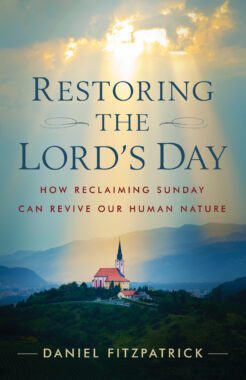One of the chief trends in modern life is from the rural to the urban setting. We must note, of course, that the city itself is not a strictly modern development. Cities have always marked civilization, from Troy to Athens, from Rome to Paris, from London to New York. Cities afford opportunities for the development of such advanced culture as can hardly be achieved by isolated families living in the country. A well-ordered city becomes a locus of urbanitas, that spirit of cultural flourishing which allows for the exaltation of the human spirit reaching out joyfully to God. Without the city, we would have no Plato, no Augustine, no Aquinas, no Lemaître. We would have no Chartres Cathedral or Florentine Duomo, no Divine Comedy or Odyssey, no Ode to Joy or Clarinet Concerto.
Even for those who live in a rural, agricultural setting, the city plays an important role as the locus of exchange, center of religious life, and resort in case of sickness, crop failure, or natural disaster. Even the most assiduous farmer stands to benefit from a community with which he can trade, and certainly his sacramental life depends on his proximity to a parish.
Nonetheless, as Fr. Vincent McNabb observes, we may make the general distinction that while people move from the land to the city for material ends, they move from the city to the land in pursuit of true worship. This, at least, is the paradigm established by Israel’s going down to Egypt and being led forth again. They went to Egypt in a time of famine; they were blessed there, enjoying the material abundance that transformed them from a tribe into a nation. Yet, in order to learn true worship, they had to go out from the city, into the desert, away from the fruit and the fleshpots and the great works of urban man to the lean and star-filled simplicity of the desert.
The shift from rural to urban living witnessed by the modern world has served in general to deaden man’s sensibility to the rhythms of nature. Such rhythms provide built-in seasons of productivity and rest, of labor and festivity, of seeding and harvesting and storing away. As he goes from his air-conditioned home to his air-conditioned car to his air-conditioned office and back again, modern man can afford more or less to ignore the conditions of the outside world. Every day of the year, he finds the supermarket shelves laden with the same squash, zucchini, strawberries, kale, peaches, and pineapples. Seasonal climate change means little to him. Whether in July or December, he goes to work five days a week and performs the same tasks year after year.
Again, we should not present these advances beyond absolute dependence on weather and climate as somehow unequivocally evil. What a comfort it is to a parent to have the means to shield his children against the winter’s cold or to feed them apples and pears and all manner of nourishing food. Agricultural and technological progress may be perfectly consonant with man’s call to fill the earth and subdue it, cultivating it according to the power of his mind.
The dangers in these advances, however, and the means by which they render us more prone to acedia and rejection of the Lord’s Day, are two. In the first place, the capacity to insulate ourselves against the fluctuations of the natural world may well lead us to forget our fundamental dependence on God or, perhaps, in the spirit of Babel, to attempt to raise ourselves to the level of gods. When a man of sufficient means surveys the world about him, it is easy for him to act as though his security is inviolable, like the rich man of the parable who built larger barns to house his great surplus, only to have his life demanded of him that very night (Luke 12:16–21). The modern world seeks in many ways to render all of us such rich men, proof against all acts of God, man, or nature.
Second, and very closely connected to this propensity toward forgetfulness of God, is the possibility that modern life, isolated from the rhythms of the natural world, can create of man’s existence a kind of false horizontal infinity, an unending procession of workweeks trudging on toward a bleary retirement and a morphine-dulled death. Day follows day, week follows week, and we perform the same labors again and again without any Sabbath refreshment or festival retreat. Such false infinites are always present in human life, as Hegel points out in his discussion of appetites, which follow upon each other in endless succession from birth till death, or in the apparently limitless variety of finite bodies the human soul may take. The danger lies in the possibility of life itself becoming such a succession, devoid of any transcendent awareness of the eternal God who underlies all temporal change. In falling victim to this attitude, we forget the possibility of worship, of attending for a moment to that which lies beyond all succession of time—or, worse still, such worship becomes hateful to us, an interruption of our labor in moving on steadily toward death.
+
This article on The Insular City is adapted from the book Restoring the Lord’s Day by Daniel Fitzpatrick which is available from Sophia Institute Press.
Art for this post on a reflection from “Restoring the Lord’s Day” by Daniel Fitzpatrick: cover used with permission; Photo by ben o’bro on Unsplash





